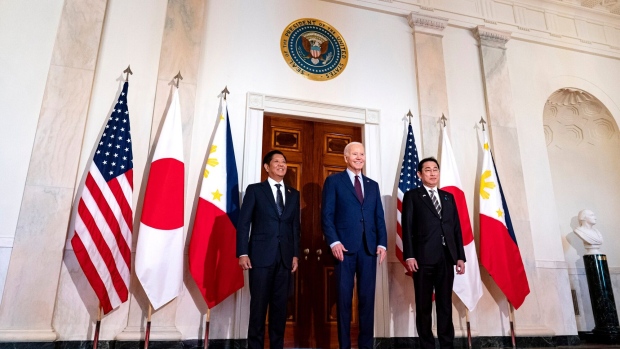Apr 11, 2024
Biden Vows to Back Japan, Philippines as China Rattles Allies
, Bloomberg News

(Bloomberg) -- President Joe Biden said he was committed to “deepening maritime and security ties” with Japan and the Philippines as he sought to assure allies worried about increasingly assertive Chinese actions in disputed waters.
“The United States defense commitments to Japan and to the Philippines are ironclad,” Biden said Thursday before a meeting with Japanese Prime Minister Fumio Kishida and Philippines President Ferdinand Marcos Jr. at the White House for the first trilateral summit among the nations.
“Any attack on Philippine aircraft, vessels or armed forces in the South China Sea would invoke our mutual defense treaty,” Biden added.
The Philippines under Marcos has adopted a more assertive footing to the growing number of Chinese patrols in the South China Sea, where both nations have competing maritime claims. Tensions are centered around the Second Thomas Shoal, where the Philippines maintains a grounded World War-II era ship. Chinese vessels have used water cannons to block Philippine military missions that rotate and resupply troops on the ship.
Beijing responded on Friday saying defense cooperation between nations should not target any specific country. Defense Ministry spokesman Wu Qian criticized a “certain non-regional country” for frequently sending military vessels and aircraft to the South China Sea and gathering its allies to build “small cliques” against China. “These acts are irresponsible and extremely dangerous,” he said.
Chinese Foreign Ministry spokeswoman Mao Ning said the joint statement from the summit “smears and attacks” China.
Biden, Kishida and Marcos agreed to step-up military exercises, including plans for Philippine and Japanese Coast Guard members to patrol aboard a US Coast Guard vessel in the Indo-Pacific, according to the statement released Thursday evening. The nations also plan to conduct more training exercises at sea.
Maritime security topped the summit agenda following a series of incidents, including Chinese Coast Guard ships firing water cannons last month at a civilian Filipino boat. The three countries joined Australia on Sunday for military drills in the South China Sea.
“We steadfastly oppose the dangerous and coercive use of Coast Guard and maritime militia vessels in the South China Sea, as well as efforts to disrupt other countries’ offshore resource exploitation,” the three leaders said in the joint statement.
At the White House earlier, Kishida said that “as the world faces a complex crisis, it is important that we work in a multi-layered effort with like-minded countries and allies to maintain and strengthen a free and open international order based on the rule of law.”
Biden and Kishida have striven to demonstrate unity with the Philippines, part of a broader US strategy to bolster partnerships in the Indo-Pacific and encourage allies to strengthen their own ties amid growing alarm over China’s military and economic influence. A joint statement issued after Biden met Kishida at the White House on Wednesday for bilateral talks mentioned China repeatedly.
The US sees China increasing the use of coercive tactics and a growing number of countries pushing back, according to senior administration officials who briefed reporters Wednesday before the official announcements.
Biden and Chinese President Xi Jinping discussed the sea confrontations on a phone call last week and reiterated their respective positions, and the Chinese understand that the timing of Thursday’s meeting is keyed to those recent incidents, a senior administration official said in an interview earlier this week.
Biden said the leaders would also discuss cooperation on technology, clean energy, securing semiconductor supply chains and telecommunications.
Those wide-ranging infrastructure commitments speak to efforts by the US and allies to offer an alternative to Chinese investments in developing countries through Xi’s signature Belt and Road Initiative. With the Philippines, there’s an opening for the US to offer more investment and security cooperation to a Marcos administration that is re-working its ties with China.
In an address to the US Congress earlier Thursday, Kishida pointed out “growing cases” of economic coercion and debt-trap diplomacy, in an apparent reference to China. He also nodded at further US-Japan work on emerging technologies, including in sensitive areas like quantum computing.
Marcos is back in Washington less than a year after his last White House visit, showcasing how the Philippines has become an important focus for the US as it seeks to improve its diplomatic footing in Southeast Asia.
“We seek to identify ways of growing our economies and making them more resilient, climate-proofing our cities and our societies, sustaining our development progress,” Marcos said.
The US is in early-stage talks with Manila to help develop its critical minerals industry, including nickel deposits, but there is no official announcement pending, a senior administration official said earlier this week. China is a major presence in the Philippine mining industry.
In the conclusion of the joint statement, the three leaders said: “A new trilateral chapter between our three nations begins today.”
--With assistance from Peter Martin, Philip J. Heijmans, Jing Li and Colum Murphy.
(Updates with comments from China in fifth and sixth paragraphs)
©2024 Bloomberg L.P.





